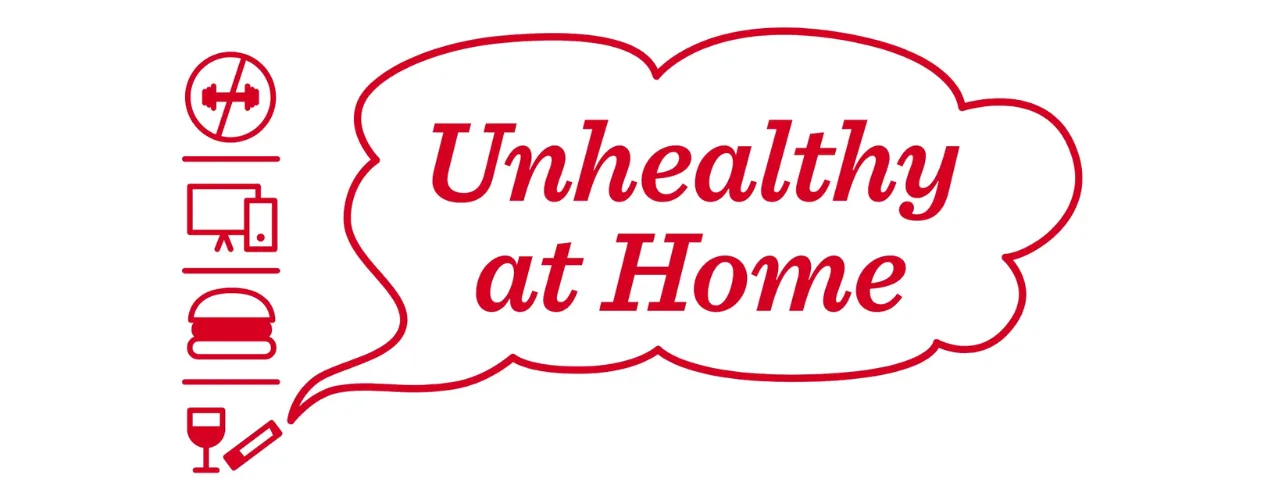Unhealthy at Home
An FSPH-led study finds that pandemic-instituted confinement resulted in many people adopting unhealthy behaviors as a way of coping.

THE DIRECT CONSEQUENCES OF SARS-COV-2 HAVE BEEN ENORMOUS, with severe illnesses and approximately 1 million deaths in the U.S. among the nation’s more than 80 million reported COVID-19 cases. The danger posed by community spread of the virus resulted in both government- and self-imposed restrictions on people’s activities, particularly early in the pandemic. And those restrictions, along with economic and other forms of distress, likely contributed to behaviors with health implications beyond those directly resulting from the virus, a study led by UCLA Fielding School of Public Health researchers found.
Dr. Liwei Chen, FSPH associate professor of epidemiology, and Dr. Jian Li, FSPH professor of environmental health sciences, led a collaboration with 10 other institutions that surveyed representative samples of adults from across the U.S. in October 2020 on their lifestyle behaviors before and during the pandemic. The study, published in the October 2021 issue of the peer-reviewed journal Nutrients, found that compared with pre-COVID habits, Americans reported reducing their exercise time by 31% while increasing the time they spent in front of a computer or television screen by 60%. Alcohol consumption went up 23%, cigarette smoking by 9%. The analysis was conducted using data from the Health, Ethnicity, and Pandemic (HEAP) Study, led by the Center for Reducing Health Disparities at the University of Nebraska.
“In public health, our most immediate concern during a pandemic is protecting people from becoming infected and spreading the virus in communities,” says Chen, the study’s lead author. “That led to stay-at-home orders and other actions to restrict nonessential activities. Although these were necessary, we found that they had profoundly negative effects on lifestyle behaviors that we know are important to promoting good health.”
Although the impact of the pandemic on health behaviors was negative across demographic groups, it disproportionately affected racial and ethnic minorities, who already bear a higher disease burden from COVID-19.
Of the five behaviors surveyed in the study, only one suggested a positive outcome of the pandemic-instituted restrictions. The average consumption of fast food dropped by more than 30%—though Chen notes that this isn’t necessarily evidence Americans were eating better. “The observed decrease in fast food consumption is likely due to the stay-at-home orders and the closure of fast-food restaurants during the pandemic,” she says. “We didn’t collect information on what particular foods people were eating or their overall caloric intake, but several studies from European countries found that people’s dietary intake was worse— that they ate lower amounts of fruits and vegetables, and less fresh food overall.”
The physical confinement wasn’t the only factor that contributed to the unhealthier pandemic habits. In another publication from the HEAP Study led by the same UCLA Fielding School team and published in the November 2021 issue of the peer-reviewed Journal of Occupational and Environmental Medicine, the researchers found that among U.S. adults who were working before the COVID-19 pandemic, negative employment changes — including pay cuts and both temporary and permanent job losses —were associated with higher psychological distress. “Under stress, many people adopt unhealthy behaviors as away of coping, or reduce their healthy behaviors,” Li says.

The UCLA Fielding School-led research found that, although the impact of the pandemic on health behaviors was negative across demographic groups, it disproportionately affected racial and ethnic minorities, who already bear a higher disease burden from COVID-19. For example, Chen notes, increases in alcohol consumption and smoking were highest among Hispanic and Black Americans, while the effects of negative employment changes on psychological distress—a likely contributor to unhealthier behaviors—were greatest among Asian Americans and Black Americans.
Other contributors to the behavioral changes reported during the height of the pandemic included racism and discrimination. Chen’s research team found that COVID-related racial discrimination, including cyberbullying and hate crimes against Asian American and Pacific Islander populations, was associated with decreased exercise and increased screen time. Chen notes that in many surveys, sample sizes for Asian American populations are too small to draw statistically significant conclusions, particularly among Asian American subpopulations, but the HEAP data oversamples these groups to enable such analyses.
The researchers note that their work has limitations — the survey was carried out at the peak of the pandemic in the U.S., so it’s not clear to what extent the unhealthier lifestyle behaviors represented a short-term response, as opposed to changes that persisted even after the restrictions were loosened. Nonetheless, they believe their findings underscore the importance of a public health response to pandemics and other emergencies that seeks to mitigate the potentially harmful lifestyle effects.

“We found a marked increase in sedentary behaviors, alcohol consumption and cigarette smoking, and a decline in exercise,” says Li, who is also affiliated with the UCLA Fielding School’s Center for Occupational and Environmental Health and the National Institute for Occupational Safety and Health (NIOSH) Southern California Education and Research Center. "Further research is needed to determine whether these persisted as the pandemic continued, and whether individuals’ quality of life and health well-being are subsequently affected. But it is clear that resources and support that can address mental health and help people maintain healthy lifestyles during the pandemic and afterward are urgently needed.”

